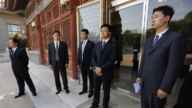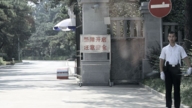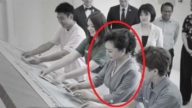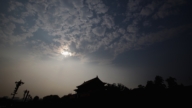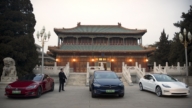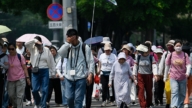【新唐人2012年7月2日讯】日本《外交学者》杂志发表文章指出,大陆中央政法委书记周永康的继任者,很可能会在中共18大上被降级,不能进入政治局常委。常委人数会从9人变为7人,主管宣传的李长春的继任者也将不再进入常委。分析人士认为,不管中共如何调整,都不可能放松笔杆子、枪杆子,只有解体中共,中国才会有根本的变化。
日本《外交学者》杂志6月29号的这篇文章谈到,中央政法委掌控全国的警察、司法、情报系统,权力过大。政法委主导的“维稳机制”已经给社会带来非常大的负面影响,大陆民众对此越发感到愤怒。
文章分析,中共总书记胡锦涛与他的继任者习近平出于对官员腐败的担忧,可能已经在政法委的问题上达成一致。最近,习近平负责的中央党校出版物《学习时报》批评政法委的“维稳处理模式”,矛头指向周永康。这意味着中共总书记将收回对维稳系统的控制,中央政法委书记周永康的继任者将被降级,不再进入政治局常委。
今年2月,前重庆公安局长王立军出逃美国领事馆申请避难。随后,周永康培植的中央政法委书记接班人、前重庆市委书记薄熙来被免职调查。山东维权人士陈光诚在历尽政法委的迫害后,4月底传奇般逃进美国大使馆,要求温家宝查处山东政法官员的犯罪行为。
6月初,又有湖南六四斗士李旺阳在警察看守下离奇死亡,当局号称李旺阳是自杀,但因为漏洞太多,而受到普遍质疑,各界民众组织了声势浩大的活动,要求当局彻查真相。
这一连串事件揭开政法委系统的重重黑幕,社会各界取消政法委的呼声日渐高涨。在大陆各省最近的党委换届中,政法委书记一职不再像以往一样由省公安厅长担任。
时事评论员汪北稷:“所以呢,海外普遍对中共政治局18大常委最终9变7、政法委这个角色淡化掉、不进入常委,这个推论是有一定依据的。”
汪北稷指出,中共也在试图为了维护统治而进行改头换面,但是这只是换汤不换药,改变不了中共作恶的本质。
汪北稷:“中共不可能改变靠笔杆子和枪杆子来统治社会、来镇压人民的本性。所以它无论是把政法委这个角色换上换下,还是把‘社会治安综合治理管理委员会’改名字改得很拗口,改来改去没有意义。”
《外交学者》杂志的这篇文章还谈到,因为常委人数需要是单数才好进行表决,政法委书记这一职务的降级意味着常委人数会从9人变为7人,主管文化宣传的继任者也将不再进入常委。这导致入常人选的洗牌会更加猛烈,中共的最高权力移交存在巨大的不确定性。
汪北稷:“说到它在9大常委里面去掉两个,去掉管宣传、管笔杆子这个常委,也是一个表面动作。因为它没有改变它的本性。就是说,现代社会的政党不应该干涉很多东西,不应该去干涉意识形态,也不应该去干涉一个社会的文化发展、存在、相互之间的繁荣,包括信仰、宗教这些。”
汪北稷强调,中共实行的是全面的垄断和集权,在民众的反抗下,它的统治危机越来越大。中共被迫做一些表面的修改,制造要放松枪杆子、笔杆子的假象,但实际上这只是中共的谎言,变换花样来继续控制民众。
采访/常春 编辑/李谦 后制/李若琳
Japan Media: Knew Zhou Yongkang’s Position Would Be Lowered
Japan’s Diplomat magazine predicted that
the successor of Zhou Yongkang, chief of
the Political-Legislative Affairs Committee of the Chinese
Communist Party would probably be downgraded.
The CCP Politburo Standing Committee would be shrunk
to 7 seats from 9 and the successor of Li Changchun,
propaganda chief could also be expected to be kicked out of
the Politburo Standing Committee.
Commentators say, no matter how the CCP changes
its appearance, the regime will not relax its control over crackdown and propaganda.
Only the disintegration of the CCP can bring real change
to China.
The Diplomat magazine reviewed on June 29 that
the PLAC was overpowered for"controlling the police,
domestic intelligence, the procuratorate and prisons."
“The security-first preserving stability policy" has created
“perverse effects" for the Chinese who have become increasingly angry.
The article thinks that Hu Jintao and his successor, Xi Jinping,
“may have reconciled over the need to reform the CCP".
The official publications of the Central Party School headed
by Xi recently criticized the PLAC’s “handling of preserving stability" and Zhou Yongkang.
This implies that the power of preserving stability
would be taken back by the CCP general secretary
and the position of Zhou’s successor would
be downgraded “to the Politburo level".
In February, Chongqing’s ex-top cop Wang Lijun fled to
the US consulate to seek asylum.
Subsequently, Zhou Yongkang’s chosen successor Bo Xilai,
ex- Party chief of Chongqing, was ousted and investigated.
Next ensued the successful escape of Chen Guangcheng
from the PLAC’s persecution of he and his family in Shandong.
Chen entered the US embassy at the end of April,
while openly calling on Wen Jiabao to investigate
and punish the crimes committed by Shandong PLAC.
In early June, 6.4 Tiananmen protest activist Li Wangyang
died suspiciously in custody in Hunan.
Local authorities’flawed allegation that Li death was suicide
aroused wide public suspicion.
Afterwards, large-scale mass activities were staged
demanding that authorities investigate Li’s death.
A string of incidents kept unveiling inside stories of the PLAC,
leading to public voices’growing louder of removing the PLAC.
In CCP’s recent provincial power transfer,
the position of PLAC’s Party chief was no longer
held by the CCP’s top provincial cop.
Wang Beiji (Critic): “Overseas, it’s generally believed that
the Politburo Standing Committee is expected to be cut down to 7 seats from 9 at the CCP’s 18th Congress.
And the role of the PLAC would be diluted and downgraded.
Such an understanding is reasonable, I think."
Wang Beiji points out that the CCP is trying to have
a make-over in order to maintain its rule.
That is just a change in form but not in content, which
Remains unchanged the CCP’s nature of committing evil deeds, says Wang.
Wang Beiji: “It’s impossible for the CCP to change its nature
of controlling China and the people by suppression and propaganda.
No matter how it positions the PLAC, or how it changes
the name of Central Committee of Public Security Commission, the actions are just not making sense."
The Diplomat magazine states, lowering the position of the
PLAC chair implies that the
standing committee would be shrunk to 7 members from 9,
as it needs to have an odd number of positions,
and the successor in charge of propaganda would also be
kicked out of the standing committee.
That suggests a “possibility of even more significant
reshuffling of leadership portfolios" and
“the tremendous uncertainty surrounding the power transfer
to the so-called Fifth Generation of Chinese leaders."
Wang Beiji: “Even the dropping of security and propaganda
from its standing committee is a floating action.
This is because its nature is still unchanged.
In other words, a normal political party is supposed not to
interfere with a lot of things,
including ideology, the existence and development of
the culture, and its prosperity, individual’s faith and religions."
Wang says that the CCP exerts an all-sided monopoly and
centralization over China, and the growing mass resistance has inflated its rule crisis.
Under these circumstances, the regime has to resort to
some surface change by creating illusions like
loosening controls over crackdown and propaganda,
Wang says.
But it is actually the CCP’s lies that reduce
its ways to continue its control of the people.


